Send them to Tahiti .If they want to live in the most beautiful place in the world, why fuck are they coming to Canada?
Refugee/Migrant Crisis
- Thread starter Tecumsehsbones
- Start date
You are using an out of date browser. It may not display this or other websites correctly.
You should upgrade or use an alternative browser.
You should upgrade or use an alternative browser.
Canada’s population grows by more than 1 million for first time
Was the fastest expansion among advanced economies and on par with many African nations
Author of the article:Bloomberg News
Bloomberg News
Randy Thanthong-Knight
Published Mar 23, 2023 • Last updated 1 day ago • 2 minute read
(Bloomberg) — Canada’s population grew 2.7% in 2022, the fastest expansion among advanced economies and on par with many African nations.
The country added a record 1,050,110 people over a one-year period to Jan. 1, bringing the total population to 39,566,248, Statistics Canada reported Wednesday in Ottawa. International migration accounted for 95.9% of the growth — a testament to Canada’s decision to counter the economic drag of an aging populace by throwing its doors open to newcomers.
It marks the first time the northern nation grew by more than a million people in a year, while its industrial peers try different ways to address demographic challenges, including raising the retirement age. If this population growth rate is sustained, the statistics agency said Canada would double in size in about 26 years.
The record-setting expansion is the result of Prime Minister Justin Trudeau’s plan to add about half a million new permanent residents annually. The government has consistently raised its immigration target to grow the workforce and boost economic output, but that also threatens to worsen shortages of housing and health-care workers.
Still, recent polling by Nanos Research Group for Bloomberg News shows 52% of respondents say Trudeau’s plan will have a positive impact on Canada’s economy. That compares with 38% who see the increase as a negative.
Doug Ford, premier of Canada’s most populous province, hailed the stream of new arrivals that brought Ontario’s population to 15.4 million. But he cautioned there is work to be done to accommodate them.
“Stats Canada comes out and they said last year 450,000 people landed here in Ontario, calling this home,” Ford told reporters in the Toronto suburb of Oakville after the data was released. “That’s why we need the schools, hospitals and bridges, the infrastructure — and we especially need homes.”
Demand and Consumption
While there is broad public support for the open-door policy, rapid population growth in urban centers has sent rents soaring and forced many people to leave major cities to search for affordable housing elsewhere.
Increasing immigration not only adds to to the labor supply and fills some shortages, it also boosts demand and consumption during a period of low growth because newcomers need basic necessities from housing and food to banking and mobile phones.
Rapid population growth has already given a boost to telecommunications companies. The big three domestic players — Rogers Communications Inc., BCE Inc. and Telus Corp — reported net gains of more than 400,000 new mobile subscribers combined in the fourth quarter alone.
The increase in demand may be part of the reason why Canada’s economy is proving more resilient than expected, with jobs continuing to be added and consumer spending still holding up in the face of the highest interest rates in 15 years. Home prices are also expected to rebound quickly next year as key cities keep seeing a large influx of new population.
—With assistance from Erik Hertzberg and Danielle Bochove.
(Updates with comment from Ontario premier.)
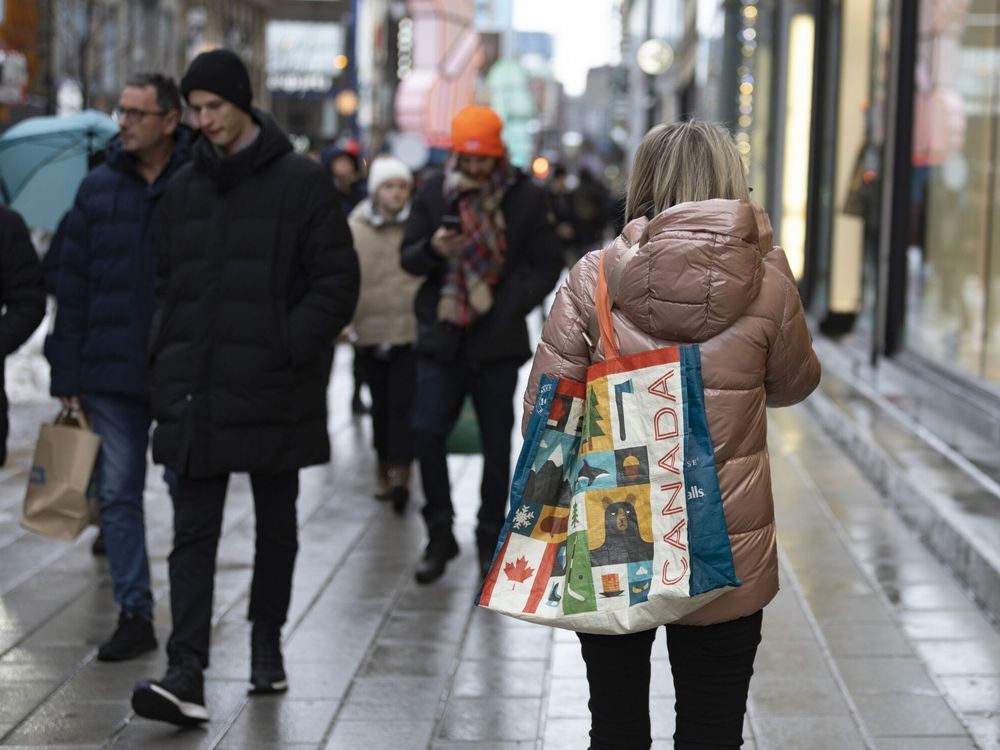
 torontosun.com
torontosun.com
Was the fastest expansion among advanced economies and on par with many African nations
Author of the article:Bloomberg News
Bloomberg News
Randy Thanthong-Knight
Published Mar 23, 2023 • Last updated 1 day ago • 2 minute read
(Bloomberg) — Canada’s population grew 2.7% in 2022, the fastest expansion among advanced economies and on par with many African nations.
The country added a record 1,050,110 people over a one-year period to Jan. 1, bringing the total population to 39,566,248, Statistics Canada reported Wednesday in Ottawa. International migration accounted for 95.9% of the growth — a testament to Canada’s decision to counter the economic drag of an aging populace by throwing its doors open to newcomers.
It marks the first time the northern nation grew by more than a million people in a year, while its industrial peers try different ways to address demographic challenges, including raising the retirement age. If this population growth rate is sustained, the statistics agency said Canada would double in size in about 26 years.
The record-setting expansion is the result of Prime Minister Justin Trudeau’s plan to add about half a million new permanent residents annually. The government has consistently raised its immigration target to grow the workforce and boost economic output, but that also threatens to worsen shortages of housing and health-care workers.
Still, recent polling by Nanos Research Group for Bloomberg News shows 52% of respondents say Trudeau’s plan will have a positive impact on Canada’s economy. That compares with 38% who see the increase as a negative.
Doug Ford, premier of Canada’s most populous province, hailed the stream of new arrivals that brought Ontario’s population to 15.4 million. But he cautioned there is work to be done to accommodate them.
“Stats Canada comes out and they said last year 450,000 people landed here in Ontario, calling this home,” Ford told reporters in the Toronto suburb of Oakville after the data was released. “That’s why we need the schools, hospitals and bridges, the infrastructure — and we especially need homes.”
Demand and Consumption
While there is broad public support for the open-door policy, rapid population growth in urban centers has sent rents soaring and forced many people to leave major cities to search for affordable housing elsewhere.
Increasing immigration not only adds to to the labor supply and fills some shortages, it also boosts demand and consumption during a period of low growth because newcomers need basic necessities from housing and food to banking and mobile phones.
Rapid population growth has already given a boost to telecommunications companies. The big three domestic players — Rogers Communications Inc., BCE Inc. and Telus Corp — reported net gains of more than 400,000 new mobile subscribers combined in the fourth quarter alone.
The increase in demand may be part of the reason why Canada’s economy is proving more resilient than expected, with jobs continuing to be added and consumer spending still holding up in the face of the highest interest rates in 15 years. Home prices are also expected to rebound quickly next year as key cities keep seeing a large influx of new population.
—With assistance from Erik Hertzberg and Danielle Bochove.
(Updates with comment from Ontario premier.)

Canada’s population grows by more than 1 million for first time
Was the fastest expansion among advanced economies and on par with many African nations
Roxham Rd is closed! Hooray!
The closure of the Roxham Road crossing at the Canada-U.S. border was “rushed” and will only further endanger the lives of asylum seekers, immigration advocates say.
The border rule change went into effect at 12:01 a.m. Eastern on Saturday, closing the small and unofficial crossing separating Quebec and New York, where tens of thousands of asylum seekers have entered Canada irregularly in the past few years.
The deal was announced just hours earlier on Friday during U.S. President Joe Biden’s visit to Ottawa and was was described as a “supplement” to the 2004 treaty known as the Safe Third Country Agreement.
Under the treaty, both Canada and the U.S. recognize each other as “safe” countries for asylum claimants, meaning individuals must make their claim at the first official border crossing they come to in either country. But that only applies to official crossing points, and crossing at unofficial points has become a popular loophole over recent years.
As of Saturday, the treaty now applies from coast to coast, meaning loopholes like Roxham Road are no more.
“It’s short-sighted, both for Canada and for refugees,” immigration lawyer Maureen Silcoff told Global News. “The solution would have been to end the agreement and allow people to cross at official ports of entry and seek asylum, allowing provinces across the country to receive them.”
Silcoff says closing the popular crossing near Hemmingford, Qc., won’t actually stop the influx of people who will try and get into Canada, it will only force them to do it more dangerously, and the people that enter will go undetected.
“Refugees should never be politicized. People will potentially die,” she said referencing past deaths of those who tried crossing in dangerous conditions.
Past tracking of people who have been turned away at the Canadian border has shown that those are the two main outcomes they faced, according to Silcoff.
“And Canada knows that. I’m concerned that all of this will happen again. The human cost is extremely high.”
Frantz André, an advocate for asylum seekers with the Action Committee for People without Status says the change was rushed, inhumane and didn’t give migrants who had already entered the U.S. with the intent of crossing into Canada enough of a warning about the closure.
New York State Representative Billy Jones told Global News on Saturday that “a lot of the people coming up here don’t have Twitter, they don’t even know this happened.”
He said the sudden announcement made just hours prior could potentially create a humanitarian issue for border communities. “A lot of people will be turned away and then stuck here without a plan.”
The closure of the Roxham Road crossing at the Canada-U.S. border was “rushed” and will only further endanger the lives of asylum seekers, immigration advocates say.
The border rule change went into effect at 12:01 a.m. Eastern on Saturday, closing the small and unofficial crossing separating Quebec and New York, where tens of thousands of asylum seekers have entered Canada irregularly in the past few years.
The deal was announced just hours earlier on Friday during U.S. President Joe Biden’s visit to Ottawa and was was described as a “supplement” to the 2004 treaty known as the Safe Third Country Agreement.
Under the treaty, both Canada and the U.S. recognize each other as “safe” countries for asylum claimants, meaning individuals must make their claim at the first official border crossing they come to in either country. But that only applies to official crossing points, and crossing at unofficial points has become a popular loophole over recent years.
As of Saturday, the treaty now applies from coast to coast, meaning loopholes like Roxham Road are no more.
“It’s short-sighted, both for Canada and for refugees,” immigration lawyer Maureen Silcoff told Global News. “The solution would have been to end the agreement and allow people to cross at official ports of entry and seek asylum, allowing provinces across the country to receive them.”
Silcoff says closing the popular crossing near Hemmingford, Qc., won’t actually stop the influx of people who will try and get into Canada, it will only force them to do it more dangerously, and the people that enter will go undetected.
“Refugees should never be politicized. People will potentially die,” she said referencing past deaths of those who tried crossing in dangerous conditions.
Past tracking of people who have been turned away at the Canadian border has shown that those are the two main outcomes they faced, according to Silcoff.
“And Canada knows that. I’m concerned that all of this will happen again. The human cost is extremely high.”
Frantz André, an advocate for asylum seekers with the Action Committee for People without Status says the change was rushed, inhumane and didn’t give migrants who had already entered the U.S. with the intent of crossing into Canada enough of a warning about the closure.
New York State Representative Billy Jones told Global News on Saturday that “a lot of the people coming up here don’t have Twitter, they don’t even know this happened.”
He said the sudden announcement made just hours prior could potentially create a humanitarian issue for border communities. “A lot of people will be turned away and then stuck here without a plan.”
They were still crossing this morning .Roxham Rd is closed! Hooray!
The closure of the Roxham Road crossing at the Canada-U.S. border was “rushed” and will only further endanger the lives of asylum seekers, immigration advocates say.
The border rule change went into effect at 12:01 a.m. Eastern on Saturday, closing the small and unofficial crossing separating Quebec and New York, where tens of thousands of asylum seekers have entered Canada irregularly in the past few years.
The deal was announced just hours earlier on Friday during U.S. President Joe Biden’s visit to Ottawa and was was described as a “supplement” to the 2004 treaty known as the Safe Third Country Agreement.
Under the treaty, both Canada and the U.S. recognize each other as “safe” countries for asylum claimants, meaning individuals must make their claim at the first official border crossing they come to in either country. But that only applies to official crossing points, and crossing at unofficial points has become a popular loophole over recent years.
As of Saturday, the treaty now applies from coast to coast, meaning loopholes like Roxham Road are no more.
“It’s short-sighted, both for Canada and for refugees,” immigration lawyer Maureen Silcoff told Global News. “The solution would have been to end the agreement and allow people to cross at official ports of entry and seek asylum, allowing provinces across the country to receive them.”
Silcoff says closing the popular crossing near Hemmingford, Qc., won’t actually stop the influx of people who will try and get into Canada, it will only force them to do it more dangerously, and the people that enter will go undetected.
“Refugees should never be politicized. People will potentially die,” she said referencing past deaths of those who tried crossing in dangerous conditions.
Past tracking of people who have been turned away at the Canadian border has shown that those are the two main outcomes they faced, according to Silcoff.
“And Canada knows that. I’m concerned that all of this will happen again. The human cost is extremely high.”
Frantz André, an advocate for asylum seekers with the Action Committee for People without Status says the change was rushed, inhumane and didn’t give migrants who had already entered the U.S. with the intent of crossing into Canada enough of a warning about the closure.
New York State Representative Billy Jones told Global News on Saturday that “a lot of the people coming up here don’t have Twitter, they don’t even know this happened.”
He said the sudden announcement made just hours prior could potentially create a humanitarian issue for border communities. “A lot of people will be turned away and then stuck here without a plan.”
Got an article? I need to be enragedThey were still crossing this morning .
Saw it on different website . Don’t know how accurate it is .Got an article? I need to be enraged
They were still crossing this morning .
Roxham Road, which had become a notorious unofficial crossing for asylum seekers into Canada, closed at midnight on Saturday. But dozens crossed anyway, including one group with a baby and a toddler just after midnight. Police took them into custody, warning them they could be turned around.Got an article? I need to be enraged
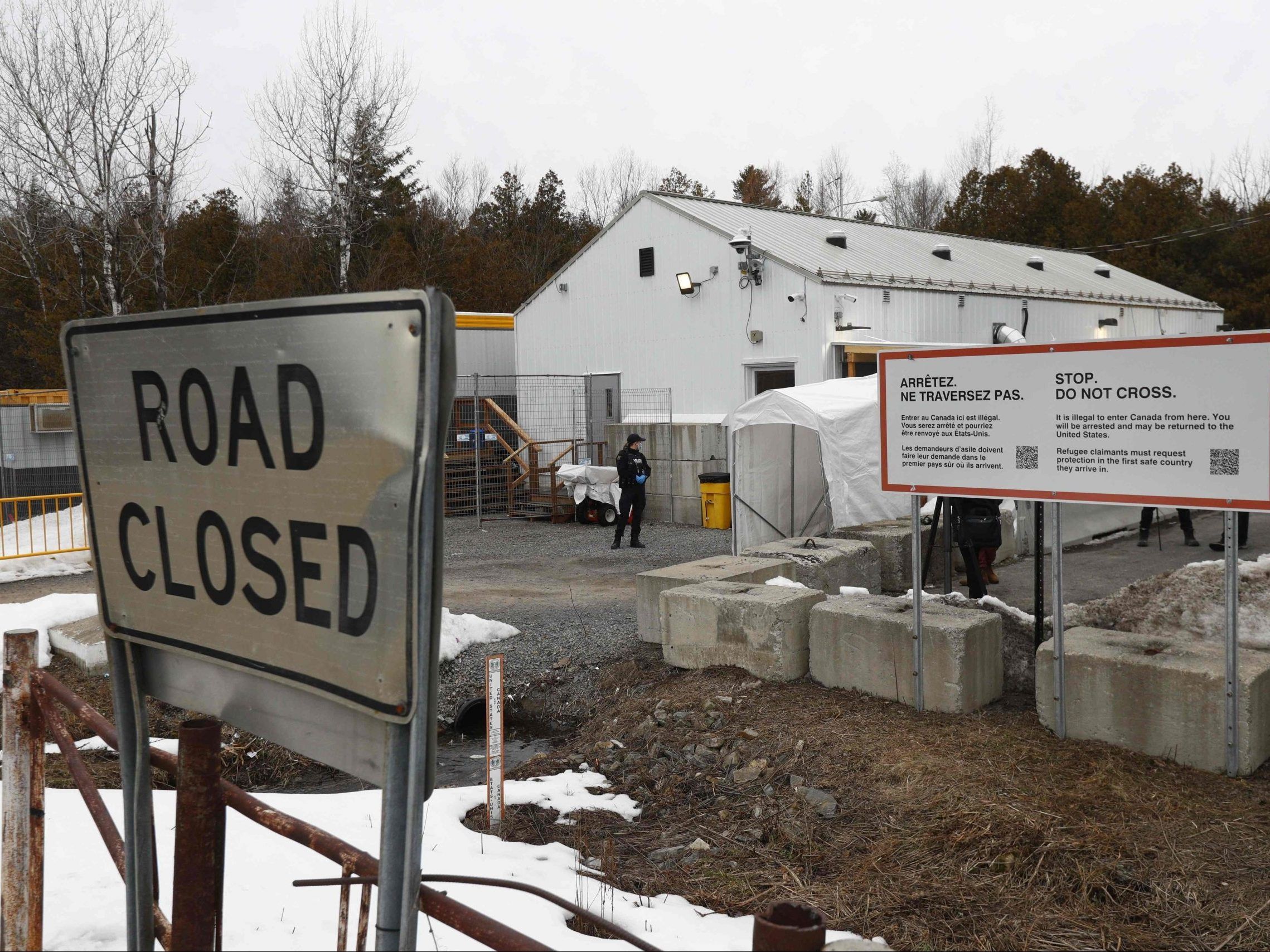
EDITORIAL: Closing Roxham Rd. is largely symbolic
Prime Minister Justin Trudeau and U.S. President Joe Biden claim they’ve fixed the problem.

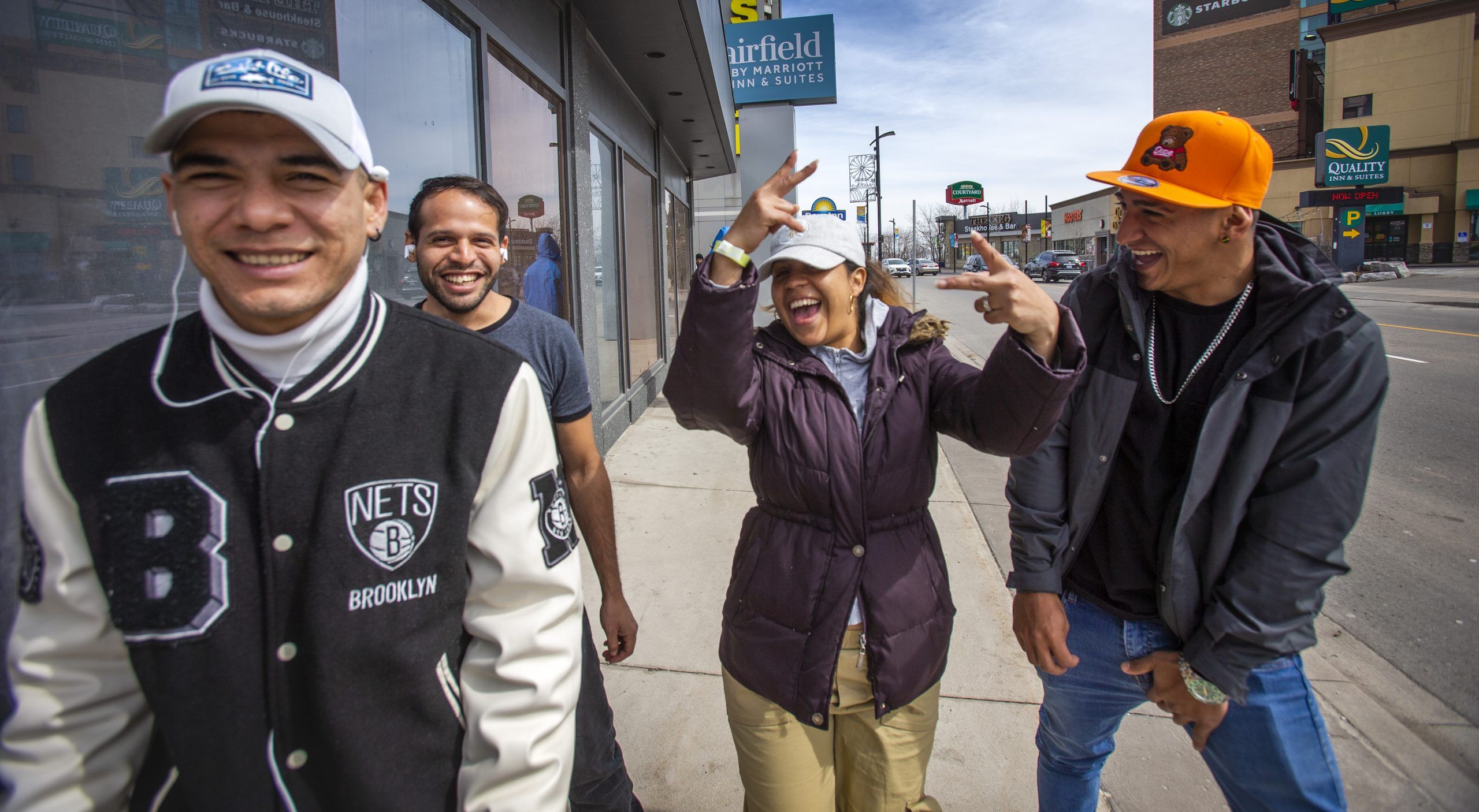
WARMINGTON: Federal government books 500 more hotel rooms despite 'closing' Roxham Road
They may be immigration pioneers and amongst the last of the Roxham Road border crossers at the same time.
I don't know why closing the unofficial crossing would be a danger to asylum seekers - they'd be fine exactly where they are - in the U.S. The so-called "advocates" are just messing with us.Roxham Rd is closed! Hooray!
The closure of the Roxham Road crossing at the Canada-U.S. border was “rushed” and will only further endanger the lives of asylum seekers, immigration advocates say.
The border rule change went into effect at 12:01 a.m. Eastern on Saturday, closing the small and unofficial crossing separating Quebec and New York, where tens of thousands of asylum seekers have entered Canada irregularly in the past few years.
The deal was announced just hours earlier on Friday during U.S. President Joe Biden’s visit to Ottawa and was was described as a “supplement” to the 2004 treaty known as the Safe Third Country Agreement.
Under the treaty, both Canada and the U.S. recognize each other as “safe” countries for asylum claimants, meaning individuals must make their claim at the first official border crossing they come to in either country. But that only applies to official crossing points, and crossing at unofficial points has become a popular loophole over recent years.
As of Saturday, the treaty now applies from coast to coast, meaning loopholes like Roxham Road are no more.
“It’s short-sighted, both for Canada and for refugees,” immigration lawyer Maureen Silcoff told Global News. “The solution would have been to end the agreement and allow people to cross at official ports of entry and seek asylum, allowing provinces across the country to receive them.”
Silcoff says closing the popular crossing near Hemmingford, Qc., won’t actually stop the influx of people who will try and get into Canada, it will only force them to do it more dangerously, and the people that enter will go undetected.
“Refugees should never be politicized. People will potentially die,” she said referencing past deaths of those who tried crossing in dangerous conditions.
Past tracking of people who have been turned away at the Canadian border has shown that those are the two main outcomes they faced, according to Silcoff.
“And Canada knows that. I’m concerned that all of this will happen again. The human cost is extremely high.”
Frantz André, an advocate for asylum seekers with the Action Committee for People without Status says the change was rushed, inhumane and didn’t give migrants who had already entered the U.S. with the intent of crossing into Canada enough of a warning about the closure.
New York State Representative Billy Jones told Global News on Saturday that “a lot of the people coming up here don’t have Twitter, they don’t even know this happened.”
He said the sudden announcement made just hours prior could potentially create a humanitarian issue for border communities. “A lot of people will be turned away and then stuck here without a plan.”
Bleeding hearts who would never accept a Haitian into their own home.
Isn't that the truth! See Martha's Vineyard as the perfect example of - not in my backyard right?Bleeding hearts who would never accept a Haitian into their own home.
BINGO!Isn't that the truth! See Martha's Vineyard as the perfect example of - not in my backyard right?
Canada and the United States waited a year (???) to announce a new deal to turn asylum seekers away at unofficial border crossings, such as Roxham Road between Quebec and New York, to avoid a rush of migrants before the new rules could be enforced, the two countries said Sunday.
Last year, almost 40,000 people crossed into Canada at unofficial border points to make an asylum claim. Most of them arrived at Roxham Road. Smaller but growing numbers of migrants have been crossing the border in the other direction, from Canada to the U.S. They have primarily been Mexican nationals, who can enter Canada without visas.
On Friday, during President Joe Biden’s visit to Canada, he and Prime Minister Justin Trudeau announced that they had renegotiated the Safe Third Country Agreement, with the revised deal taking effect within hoursThe changes meant that the two countries could start turning away asylum seekers whether they entered at official or unofficial border points.
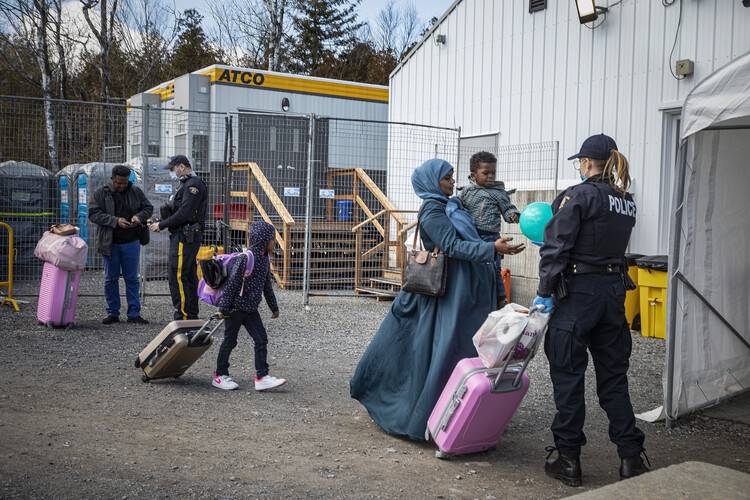
 apple.news
apple.news
Last year, almost 40,000 people crossed into Canada at unofficial border points to make an asylum claim. Most of them arrived at Roxham Road. Smaller but growing numbers of migrants have been crossing the border in the other direction, from Canada to the U.S. They have primarily been Mexican nationals, who can enter Canada without visas.
On Friday, during President Joe Biden’s visit to Canada, he and Prime Minister Justin Trudeau announced that they had renegotiated the Safe Third Country Agreement, with the revised deal taking effect within hoursThe changes meant that the two countries could start turning away asylum seekers whether they entered at official or unofficial border points.
U.S., Canada kept migrant crossing deal a secret to avoid rush at the border — The Globe and Mail
Governments feared a premature announcement before updated regulations were in effect ‘would stimulate a large influx of migrants trying to get to Canada,’ U.S. ambassador says
Hey look over there .Canada and the United States waited a year (???) to announce a new deal to turn asylum seekers away at unofficial border crossings, such as Roxham Road between Quebec and New York, to avoid a rush of migrants before the new rules could be enforced, the two countries said Sunday.
Last year, almost 40,000 people crossed into Canada at unofficial border points to make an asylum claim. Most of them arrived at Roxham Road. Smaller but growing numbers of migrants have been crossing the border in the other direction, from Canada to the U.S. They have primarily been Mexican nationals, who can enter Canada without visas.
On Friday, during President Joe Biden’s visit to Canada, he and Prime Minister Justin Trudeau announced that they had renegotiated the Safe Third Country Agreement, with the revised deal taking effect within hoursThe changes meant that the two countries could start turning away asylum seekers whether they entered at official or unofficial border points.

U.S., Canada kept migrant crossing deal a secret to avoid rush at the border — The Globe and Mail
Governments feared a premature announcement before updated regulations were in effect ‘would stimulate a large influx of migrants trying to get to Canada,’ U.S. ambassador saysapple.news
Asylum seeker deal between U.S. and Canada won't stop drama at border, advocates say
Author of the article:Canadian Press
Canadian Press
Marisela Amador
Published Mar 25, 2023 • Last updated 1 day ago • 4 minute read
PLATTSBURGH, N.Y. — A sign emblazoned with warnings of potential arrest for illegal asylum seekers now looms over the unofficial Canada-U. S. border crossing at Roxham Road in Quebec. But experts who work directly with those hoping to start a new life in Canada say they doubt such warnings, and the new migration rules they’re intended to uphold, will do much to deter cross-border traffic.
Restricting access to the border and preventing migrants from accessing a safe pathway into the country will only incentivize bad-faith actors, said Abdulla Daoud, executive director of Montreal-based The Refugee Centre.
“This type of decision-making ⦠in the past, has led to the creation of many human traffickers and smuggling rings,” Daoud said in an interview on Friday. “Canada never really had to deal with that too much. But now I think we’re going to see the numbers increase because these individuals are not going to go away.”
The new rules were announced on Friday during U.S. President Joe Biden’s trip to Ottawa.
It was described in U.S. documents as a “supplement” to the 2004 treaty known as the Safe Third Country Agreement. That treaty prevents people in Canada or in the United States from crossing the border and making a refugee claim in either country — but until now, it only covered official points of entry.
As of Saturday, the treaty started to apply along the nearly 9,000-kilometre border, including at popular unofficial crossings like Roxham Road through which tens of thousands of asylum seekers have entered Canada in the past few years.
All was quiet there on Saturday morning, with only members of the media on-hand awaiting the arrival of new would-be asylum seekers.
The sign installed on Friday and unveiled at midnight when the new agreement took effect now warns newcomers that it is illegal to enter Canada through Roxham Road.
“You will be arrested and may be returned to the United States. Refugee claimants must request protection in the first safe country they arrive in,” the new sign reads.
The executive director of Home of the World, a shelter for asylum seekers and migrants in Montreal, said it is possible that would-be refugees who are determined to cross into Canada may end up dying by taking dangerous routes into the country.
“It’s very possible that people will try to cross over using more hidden places and get stuck in the woods for two weeks and end up losing their lives,” Eva Gracia-Turgeon said in an interview. “We are talking about not only individuals but also families and pregnant women and young children who are going to cross. So potentially, there will be more drama at the border.”
One American official also voiced concern about the impact the new deal would have on residents on the U.S. side of the border.
“This becomes a local issue when you still have an influx of people coming here,” said Billy Jones, an assembly member in the New York state legislature. “If they are denied entry, where are they going? What are they doing? As well as the humanitarian part of it. We don’t want people stranded along the border, oftentimes not prepared for the conditions that we have out here.”
The expanded Safe Third Party Agreement will also see Canada commit to welcoming 15,000 immigrants from across the Western Hemisphere this year, more than three times the number previously intended.
But Jenny Kwan, the New Democrat critic for Immigration, Refugees and Citizenship, said widening official pathways for seeking asylum will do little to ease pressures at the border.
“In 2022, nearly 40,000 migrants entered the country through Roxham Road,” she said in a statement in which she roundly condemned the expanded agreement. “This ineffective measure will not protect Canadians — it will only further endanger and marginalize asylum seekers fleeing persecution and trying to come to safety in Canada.”
Both Kwan and the Canadian Council for Refugees also criticized the Liberal government for proceeding with the expansion while the country’s top court is still grappling with questions about the constitutionality of the original deal.
“The Supreme Court (of Canada) is expected to rule soon on whether the existing Safe Third Country Agreement violates the Canadian Charter of Rights and Freedoms — it is shocking that the Canadian government is extending the Agreement while the question of the constitutionality of the Agreement is before the Court,” the council said in a statement.
Amnesty International Canada called the agreement “shameful” and described it as an affront to the rights of refugees.
“People fleeing their home countries, and then risking their lives by crossing irregularly into Canada, would not take such drastic steps if the United States’ immigration and refugee-protection system could be counted on to respect migrants’ rights,” Canadian Secretary-General Ketty Nivyabandi said in a statement.
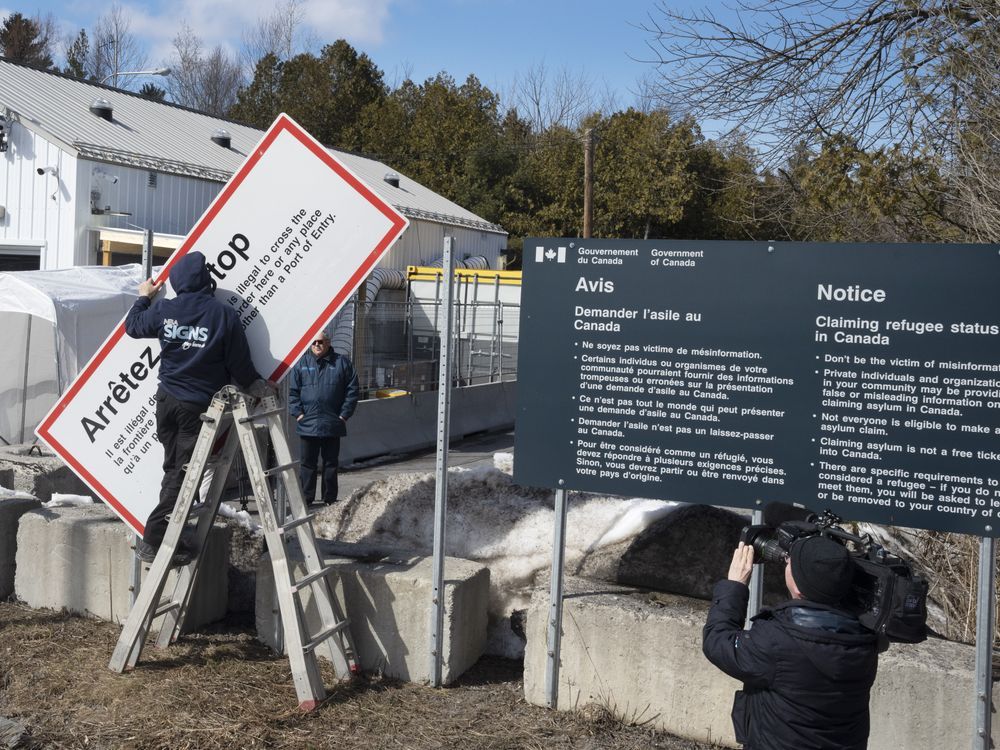
 torontosun.com
torontosun.com
Author of the article:Canadian Press
Canadian Press
Marisela Amador
Published Mar 25, 2023 • Last updated 1 day ago • 4 minute read
PLATTSBURGH, N.Y. — A sign emblazoned with warnings of potential arrest for illegal asylum seekers now looms over the unofficial Canada-U. S. border crossing at Roxham Road in Quebec. But experts who work directly with those hoping to start a new life in Canada say they doubt such warnings, and the new migration rules they’re intended to uphold, will do much to deter cross-border traffic.
Restricting access to the border and preventing migrants from accessing a safe pathway into the country will only incentivize bad-faith actors, said Abdulla Daoud, executive director of Montreal-based The Refugee Centre.
“This type of decision-making ⦠in the past, has led to the creation of many human traffickers and smuggling rings,” Daoud said in an interview on Friday. “Canada never really had to deal with that too much. But now I think we’re going to see the numbers increase because these individuals are not going to go away.”
The new rules were announced on Friday during U.S. President Joe Biden’s trip to Ottawa.
It was described in U.S. documents as a “supplement” to the 2004 treaty known as the Safe Third Country Agreement. That treaty prevents people in Canada or in the United States from crossing the border and making a refugee claim in either country — but until now, it only covered official points of entry.
As of Saturday, the treaty started to apply along the nearly 9,000-kilometre border, including at popular unofficial crossings like Roxham Road through which tens of thousands of asylum seekers have entered Canada in the past few years.
All was quiet there on Saturday morning, with only members of the media on-hand awaiting the arrival of new would-be asylum seekers.
The sign installed on Friday and unveiled at midnight when the new agreement took effect now warns newcomers that it is illegal to enter Canada through Roxham Road.
“You will be arrested and may be returned to the United States. Refugee claimants must request protection in the first safe country they arrive in,” the new sign reads.
The executive director of Home of the World, a shelter for asylum seekers and migrants in Montreal, said it is possible that would-be refugees who are determined to cross into Canada may end up dying by taking dangerous routes into the country.
“It’s very possible that people will try to cross over using more hidden places and get stuck in the woods for two weeks and end up losing their lives,” Eva Gracia-Turgeon said in an interview. “We are talking about not only individuals but also families and pregnant women and young children who are going to cross. So potentially, there will be more drama at the border.”
One American official also voiced concern about the impact the new deal would have on residents on the U.S. side of the border.
“This becomes a local issue when you still have an influx of people coming here,” said Billy Jones, an assembly member in the New York state legislature. “If they are denied entry, where are they going? What are they doing? As well as the humanitarian part of it. We don’t want people stranded along the border, oftentimes not prepared for the conditions that we have out here.”
The expanded Safe Third Party Agreement will also see Canada commit to welcoming 15,000 immigrants from across the Western Hemisphere this year, more than three times the number previously intended.
But Jenny Kwan, the New Democrat critic for Immigration, Refugees and Citizenship, said widening official pathways for seeking asylum will do little to ease pressures at the border.
“In 2022, nearly 40,000 migrants entered the country through Roxham Road,” she said in a statement in which she roundly condemned the expanded agreement. “This ineffective measure will not protect Canadians — it will only further endanger and marginalize asylum seekers fleeing persecution and trying to come to safety in Canada.”
Both Kwan and the Canadian Council for Refugees also criticized the Liberal government for proceeding with the expansion while the country’s top court is still grappling with questions about the constitutionality of the original deal.
“The Supreme Court (of Canada) is expected to rule soon on whether the existing Safe Third Country Agreement violates the Canadian Charter of Rights and Freedoms — it is shocking that the Canadian government is extending the Agreement while the question of the constitutionality of the Agreement is before the Court,” the council said in a statement.
Amnesty International Canada called the agreement “shameful” and described it as an affront to the rights of refugees.
“People fleeing their home countries, and then risking their lives by crossing irregularly into Canada, would not take such drastic steps if the United States’ immigration and refugee-protection system could be counted on to respect migrants’ rights,” Canadian Secretary-General Ketty Nivyabandi said in a statement.

Asylum seeker deal between U.S. and Canada won't stop drama at border, advocates say
The new Canada-U.S. agreement will not deter migrants from trying to cross into Canada outside official ports of entry, advocacy groups say.
Deal to close Roxham Rd. was signed a year before taking effect
Author of the article:Brian Lilley
Published Mar 26, 2023 • Last updated 1 day ago • 3 minute read
The deal only went into effect this past Saturday, meaning more than 41,000 people entered Canada illegally after the deal was signed.
A refugee arrives at the Roxham Rd. border crossing at the U.S.-Canada border in Champlain, N.Y. The Roxham Rd. crossing closed at midnight March 24, as Canadian and U.S. media reported that Canada will be able to turn back illegal migrants at the crossing point on the frontier between New York state and Quebec. The reports said that Canada has agreed in return to take in some 15,000 asylum seekers from Latin America through legal channels, a move that will ease the pressure on the southern U.S. border.
Between when the Trudeau government signed the agreement to amend the Safe Third Country agreement, and when it came into force, more than 41,000 people crossed illegally into Canada at Roxham Rd.
After we add in the numbers for March, expect the final tally to be over 45,000 or the equivalent of adding the population of Chatham, Ont., via what the government calls “irregular migration.”
While the agreement was only officially announced last Friday when U.S. President Biden was in Ottawa, it was signed almost a year ago. The official document, now released, was signed by Canada on May 29, 2022, while Americans signed it on April 15, 2022.
The agreement said that it would come into effect at a later date, but coming into force at midnight 51 weeks after it was signed seems a bit much.
“Both of our countries believe in safe, fair, and orderly migration; refugee protection; and border security. This is why we will now apply the Safe Third Country Agreement to asylum seekers who cross between official points of entry,” Prime Minister Justin Trudeau said on Friday when announcing the changes.
“After midnight tonight, police and border officers will enforce the agreement and return irregular border crossers to the closest port of entry with the United States.”
This is what should have been done six years ago when the problem started, but having started the problem, Trudeau tried using it for political advantage. He was effectively importing an American wedge issue into Canadian politics, illegal immigration.
Crossing at Roxham Rd. is illegal, which is why there were big Government of Canada signs facing the American side of the border stating that fact in clear language. It’s why the RCMP would issue verbal warnings as people approached, telling them it was illegal to cross, and they would be arrested.
Once they were in Canada, though, they could declare asylum and begin a legal process to stay here.
The Safe Third country agreement recognized that Canada and the United States were safe for refugees and required people to apply in the first of the two countries they landed in. The agreement was signed two decades ago to end the problem of refugee shopping by people who were turned down on the application in one country, turning to the other.
There was a loophole, though, in that the agreement only applied at legal points of entry. That loophole was exploited by people who were mostly economic migrants trying to get a shortcut into Canada.
When Donald Trump was president, Trudeau used Roxham Rd. to show that Canada was virtuous and welcoming of immigrants while Trump was not. He tried to bait those opposed to these illegal crossings by implying they were racist, he wanted to use this for his own partisan ends.
With Joe Biden in the White House, he no longer had that edge and post-pandemic, the numbers increased. With more than 39,000 people crossing in 2022, it was a record, and the numbers for January and February were off the charts.
People who crossed into the United States illegally on the southern border — into states like Texas — were being put on a bus to New York City. Once there, officials in New York offered them bus tickets to Roxham Rd.
With record crossings, Quebec declared it was full, and the strain on their social services was too great, so the Trudeau government started bussing people to Ottawa, Toronto and Niagara Falls.
Nothing about what has been happening was fair to anyone.
It’s not fair to Canadian taxpayers, asked to foot the bills for this make-shift system. It’s not fair to the people, mostly economic migrants, to be bussed around from place to place. It’s also not fair for the 2 million people in Canada’s immigration backlog looking to follow the rules.
It’s also not fair to people languishing in actual refugee camps around the world.
This should have been fixed years ago; once the deal was signed, it should have been implemented quickly.
Instead, Trudeau used and abused this file until it no longer served his political agenda.
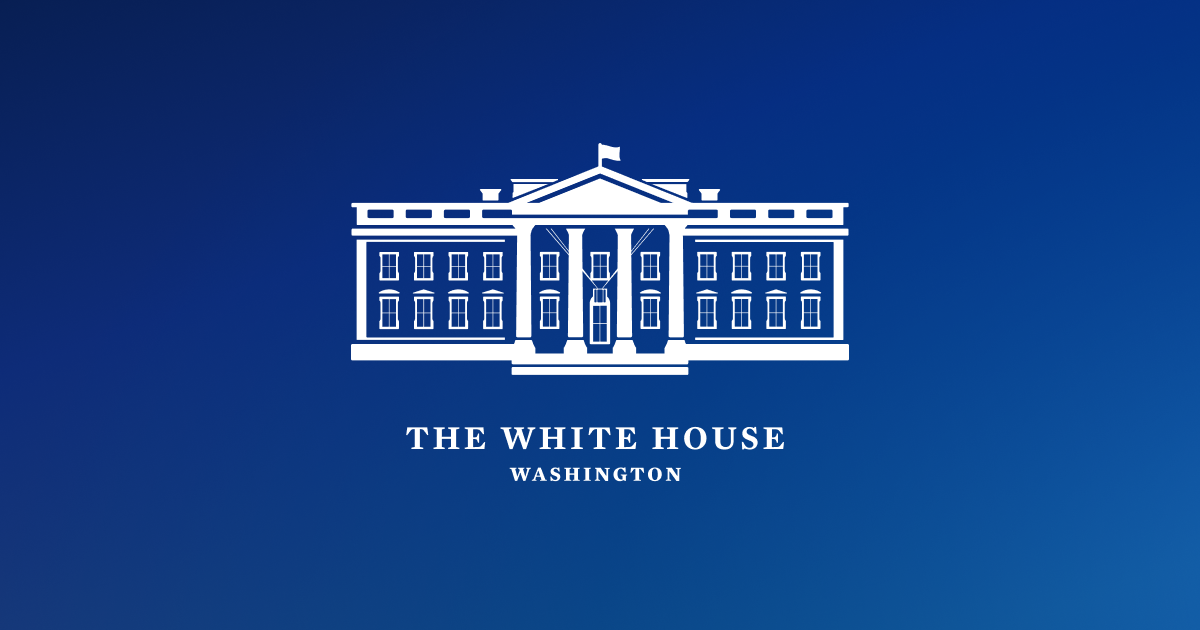
 whitehouse.gov
whitehouse.gov
 canada.ca
canada.ca
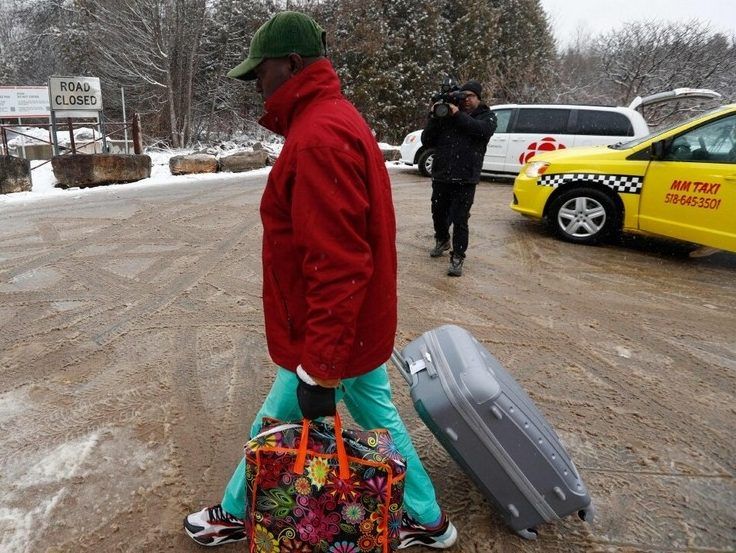
 torontosun.com
torontosun.com
Author of the article:Brian Lilley
Published Mar 26, 2023 • Last updated 1 day ago • 3 minute read
The deal only went into effect this past Saturday, meaning more than 41,000 people entered Canada illegally after the deal was signed.
A refugee arrives at the Roxham Rd. border crossing at the U.S.-Canada border in Champlain, N.Y. The Roxham Rd. crossing closed at midnight March 24, as Canadian and U.S. media reported that Canada will be able to turn back illegal migrants at the crossing point on the frontier between New York state and Quebec. The reports said that Canada has agreed in return to take in some 15,000 asylum seekers from Latin America through legal channels, a move that will ease the pressure on the southern U.S. border.
Between when the Trudeau government signed the agreement to amend the Safe Third Country agreement, and when it came into force, more than 41,000 people crossed illegally into Canada at Roxham Rd.
After we add in the numbers for March, expect the final tally to be over 45,000 or the equivalent of adding the population of Chatham, Ont., via what the government calls “irregular migration.”
While the agreement was only officially announced last Friday when U.S. President Biden was in Ottawa, it was signed almost a year ago. The official document, now released, was signed by Canada on May 29, 2022, while Americans signed it on April 15, 2022.
The agreement said that it would come into effect at a later date, but coming into force at midnight 51 weeks after it was signed seems a bit much.
“Both of our countries believe in safe, fair, and orderly migration; refugee protection; and border security. This is why we will now apply the Safe Third Country Agreement to asylum seekers who cross between official points of entry,” Prime Minister Justin Trudeau said on Friday when announcing the changes.
“After midnight tonight, police and border officers will enforce the agreement and return irregular border crossers to the closest port of entry with the United States.”
This is what should have been done six years ago when the problem started, but having started the problem, Trudeau tried using it for political advantage. He was effectively importing an American wedge issue into Canadian politics, illegal immigration.
Crossing at Roxham Rd. is illegal, which is why there were big Government of Canada signs facing the American side of the border stating that fact in clear language. It’s why the RCMP would issue verbal warnings as people approached, telling them it was illegal to cross, and they would be arrested.
Once they were in Canada, though, they could declare asylum and begin a legal process to stay here.
The Safe Third country agreement recognized that Canada and the United States were safe for refugees and required people to apply in the first of the two countries they landed in. The agreement was signed two decades ago to end the problem of refugee shopping by people who were turned down on the application in one country, turning to the other.
There was a loophole, though, in that the agreement only applied at legal points of entry. That loophole was exploited by people who were mostly economic migrants trying to get a shortcut into Canada.
When Donald Trump was president, Trudeau used Roxham Rd. to show that Canada was virtuous and welcoming of immigrants while Trump was not. He tried to bait those opposed to these illegal crossings by implying they were racist, he wanted to use this for his own partisan ends.
With Joe Biden in the White House, he no longer had that edge and post-pandemic, the numbers increased. With more than 39,000 people crossing in 2022, it was a record, and the numbers for January and February were off the charts.
People who crossed into the United States illegally on the southern border — into states like Texas — were being put on a bus to New York City. Once there, officials in New York offered them bus tickets to Roxham Rd.
With record crossings, Quebec declared it was full, and the strain on their social services was too great, so the Trudeau government started bussing people to Ottawa, Toronto and Niagara Falls.
Nothing about what has been happening was fair to anyone.
It’s not fair to Canadian taxpayers, asked to foot the bills for this make-shift system. It’s not fair to the people, mostly economic migrants, to be bussed around from place to place. It’s also not fair for the 2 million people in Canada’s immigration backlog looking to follow the rules.
It’s also not fair to people languishing in actual refugee camps around the world.
This should have been fixed years ago; once the deal was signed, it should have been implemented quickly.
Instead, Trudeau used and abused this file until it no longer served his political agenda.

Remarks by President Biden and Prime Minister Trudeau of Canada in Joint Press Conference | The White House
4:44 P.M. EDT PRIME MINISTER TRUDEAU: (As interpreted.) Good afternoon, everyone. (In English.) It is a real pleasure to welcome my friend President Biden, Joe, to Canada this week. We had the opportunity to discuss the progress made under the February 2021 Roadmap for a Renewed U.S.-Canada...
Additional protocol to the Safe Third Country Agreement - Canada.ca
Additional protocol to the Safe Third Country Agreement

LILLEY: Deal to close Roxham Rd. was signed a year before taking effect
The deal only went into effect this past Saturday meaning more than 41,000 people entered Canada illegally after the deal was signed.
Brian Lilley thinks 29 May to the following 24 March is a year? What a stupid fellow!
Or does he think the clock started ticking when the Americans signed it, and the Canadian signature was irrelevant? He's a lot closer on that.
Or does he think the clock started ticking when the Americans signed it, and the Canadian signature was irrelevant? He's a lot closer on that.
Yeah, & only two weeks ago the Trudeau Government unnamed sources were ‘leaking’ that they ‘hoped’ a deal could be reached while President Biden attended the Canadian photoshoot. You’d almost think our Prime Minister was a drama teacher or something?
“Look at this immigration deal from a year ago instead of the Chinese election interference which nobody was talking about!!!” Hmmm….
“Look at this immigration deal from a year ago instead of the Chinese election interference which nobody was talking about!!!” Hmmm….
Six Canadian children to return from Syrian detention without their mother: Advocates
Author of the article:Canadian Press
Canadian Press
Jim Bronskill
Published Apr 02, 2023 • 3 minute read
OTTAWA — Six Canadian children are set to leave a Syrian prison camp and fly to Canada without their mother, who cannot come with them because federal officials have not completed her security assessment, advocates for the family say.
The federal government gave the Quebec woman until today to decide whether her children would join other Canadians on the repatriation flight, expected to depart any day now, or remain with her in Syria, said Alexandra Bain of the group Families Against Violent Extremism.
“I’m shocked. It doesn’t make any sense,” Bain said Saturday in an interview. “It’s not how I expect Canada to behave.”
The Canadians are among the many foreign nationals in Syrian camps run by Kurdish forces that reclaimed the war-torn region from the extremist Islamic State of Iraq and the Levant.
The children, ranging in age from as young as three to 16 years, have no family in Quebec, said Bain, whose organization helps families with loved ones caught up in violent extremist groups. At least two of the six children were born in Syria. There is a plan for Quebec social service agencies to place the six in care, in three groups of two.
The mother, who has no idea if or when she will be allowed to leave al-Roj camp in northeastern Syria, is worried about how she will maintain contact with her youngsters, Bain said.
“She’s doing this for her children. And she’s terrified that she’s doing the wrong thing.”
Added lawyer Lawrence Greenspon, who is assisting the family: “It’s not a choice that any parent should ever have to make.”
Bain and Greenspon requested that the woman’s name not be published due to the sensitivity of the case and related privacy concerns.
Greenspon has argued in Federal Court on behalf of several men, women and children detained in Syria that Global Affairs Canada must arrange for their return, saying that refusing to do so violates the Charter of Rights and Freedoms.
Greenspon reached an agreement with the federal government in January to bring home six Canadian women and 13 children who had been part of the court action. All 19 are expected to be on the imminent repatriation flight from Syria.
There was hope that the Quebec woman and her six children, though not part of the court case, would also be boarding the plane together.
Greenspon said while the children have been cleared to leave Syria, their mother is still undergoing a federal security assessment.
Separating a mother from her children violates Canada’s international commitments as well as the government’s policy for assessing possible repatriation cases, Greenspon said. “Their own policy framework says that they shouldn’t be doing this.”
Global Affairs Canada did not have an immediate response to questions about the Quebec family’s case.
Bain received a Nov. 24 letter from Global Affairs saying the woman and her six children had met the criteria for federal consideration of assistance to Canadians detained in the region, spelled out in the government’s January 2021 policy framework.
The letter noted threats to the woman and her children’s safety “given the dangerous security conditions inside the camp.” It also cited reports of declining sanitary and living conditions, including possible cholera outbreaks and intermittent access to food and clean water.
Bain said the woman has been beaten and attacked while in detention.
As part of the repatriation procedures, the RCMP has recently been conducting interviews with Canadian detainees in Syria. The Quebec woman spoke with the Mounties last Wednesday, an experience she found confusing and terrifying, Bain said. The next day, “they told her she couldn’t come home.”
Bain is aware of 10 other Canadian children in detention in Syria to non-Canadian mothers. These mothers have decided not to send their children to Canada as part of the repatriation effort, she said.
This report by The Canadian Press was first published April 2, 2023.
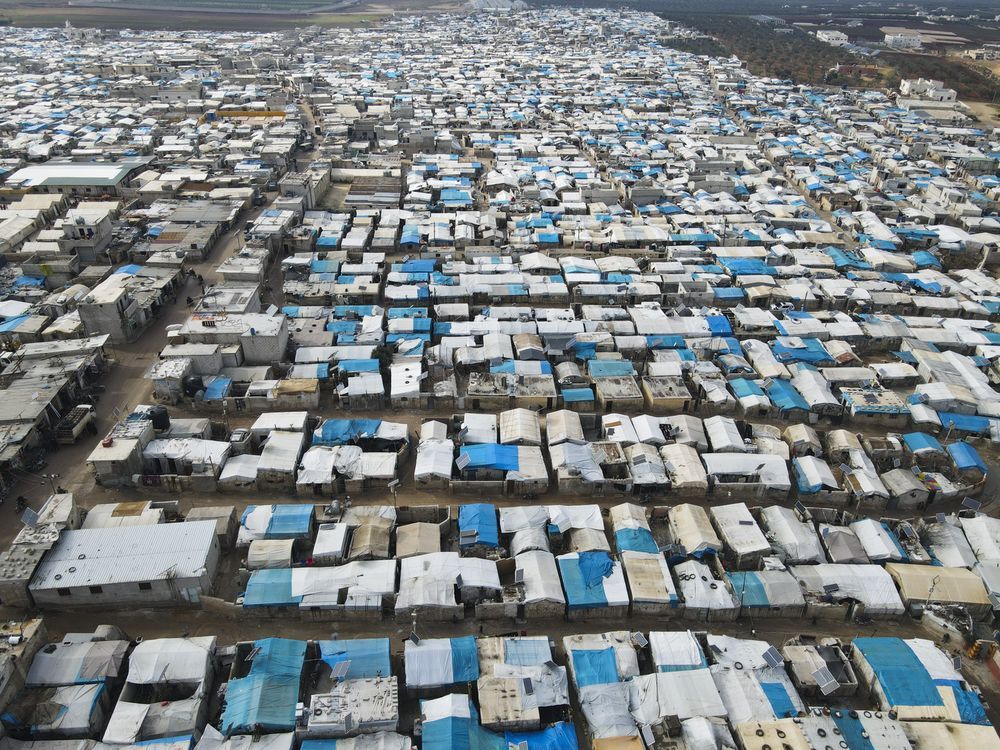
 torontosun.com
torontosun.com
Author of the article:Canadian Press
Canadian Press
Jim Bronskill
Published Apr 02, 2023 • 3 minute read
OTTAWA — Six Canadian children are set to leave a Syrian prison camp and fly to Canada without their mother, who cannot come with them because federal officials have not completed her security assessment, advocates for the family say.
The federal government gave the Quebec woman until today to decide whether her children would join other Canadians on the repatriation flight, expected to depart any day now, or remain with her in Syria, said Alexandra Bain of the group Families Against Violent Extremism.
“I’m shocked. It doesn’t make any sense,” Bain said Saturday in an interview. “It’s not how I expect Canada to behave.”
The Canadians are among the many foreign nationals in Syrian camps run by Kurdish forces that reclaimed the war-torn region from the extremist Islamic State of Iraq and the Levant.
The children, ranging in age from as young as three to 16 years, have no family in Quebec, said Bain, whose organization helps families with loved ones caught up in violent extremist groups. At least two of the six children were born in Syria. There is a plan for Quebec social service agencies to place the six in care, in three groups of two.
The mother, who has no idea if or when she will be allowed to leave al-Roj camp in northeastern Syria, is worried about how she will maintain contact with her youngsters, Bain said.
“She’s doing this for her children. And she’s terrified that she’s doing the wrong thing.”
Added lawyer Lawrence Greenspon, who is assisting the family: “It’s not a choice that any parent should ever have to make.”
Bain and Greenspon requested that the woman’s name not be published due to the sensitivity of the case and related privacy concerns.
Greenspon has argued in Federal Court on behalf of several men, women and children detained in Syria that Global Affairs Canada must arrange for their return, saying that refusing to do so violates the Charter of Rights and Freedoms.
Greenspon reached an agreement with the federal government in January to bring home six Canadian women and 13 children who had been part of the court action. All 19 are expected to be on the imminent repatriation flight from Syria.
There was hope that the Quebec woman and her six children, though not part of the court case, would also be boarding the plane together.
Greenspon said while the children have been cleared to leave Syria, their mother is still undergoing a federal security assessment.
Separating a mother from her children violates Canada’s international commitments as well as the government’s policy for assessing possible repatriation cases, Greenspon said. “Their own policy framework says that they shouldn’t be doing this.”
Global Affairs Canada did not have an immediate response to questions about the Quebec family’s case.
Bain received a Nov. 24 letter from Global Affairs saying the woman and her six children had met the criteria for federal consideration of assistance to Canadians detained in the region, spelled out in the government’s January 2021 policy framework.
The letter noted threats to the woman and her children’s safety “given the dangerous security conditions inside the camp.” It also cited reports of declining sanitary and living conditions, including possible cholera outbreaks and intermittent access to food and clean water.
Bain said the woman has been beaten and attacked while in detention.
As part of the repatriation procedures, the RCMP has recently been conducting interviews with Canadian detainees in Syria. The Quebec woman spoke with the Mounties last Wednesday, an experience she found confusing and terrifying, Bain said. The next day, “they told her she couldn’t come home.”
Bain is aware of 10 other Canadian children in detention in Syria to non-Canadian mothers. These mothers have decided not to send their children to Canada as part of the repatriation effort, she said.
This report by The Canadian Press was first published April 2, 2023.

Six Canadian children to return from Syrian detention without their mother: Advocates
Six Canadian children are set to leave a Syrian prison camp and fly to Canada without their mother, advocates for the family say.